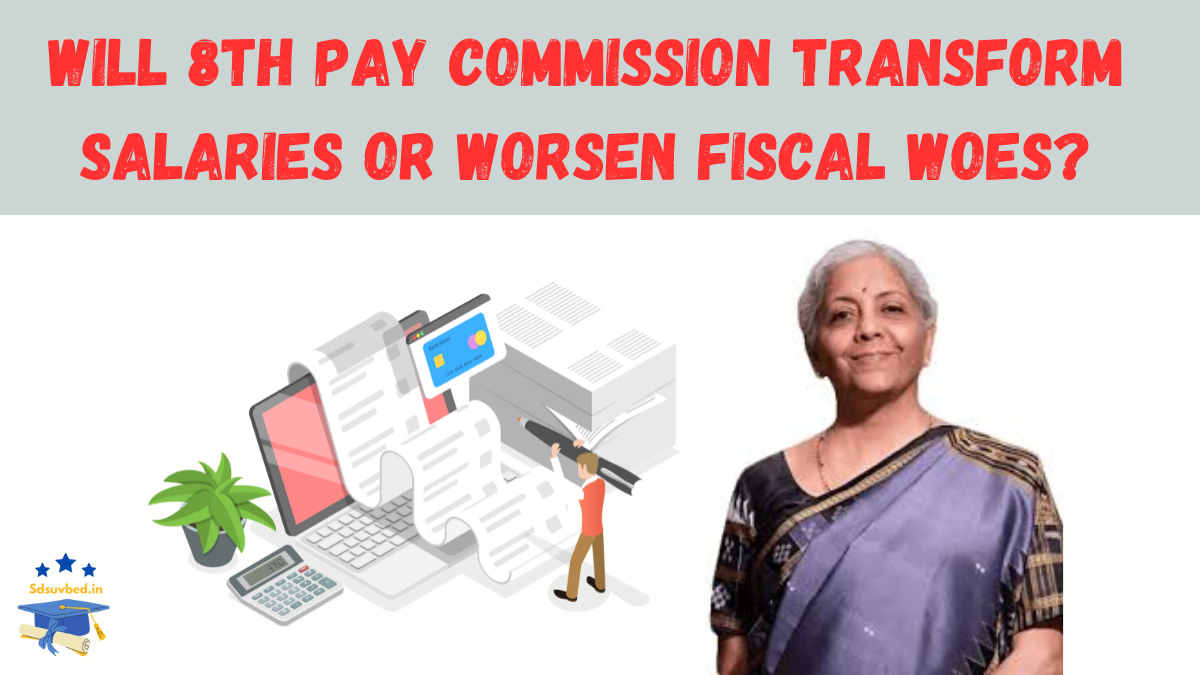The 8th Pay Commission has the potential to revolutionize government employee compensation while simultaneously addressing fiscal challenges. Recently approved by the Union Cabinet, the commission aims to revise salaries for nearly 50 lakh central government employees and update allowances for 65 lakh pensioners.
Expected to take effect on January 1, 2026, the 8th Pay Commission comes nearly a decade after the implementation of the 7th Pay Commission. This time, the commission’s scope extends beyond merely revising salaries. It includes revising the dearness allowance, aligning pay with inflation, and tackling broader structural reforms.

How Does the 8th Pay Commission Impact Salaries and the Economy?
Pay commissions play a dual role in uplifting employee morale and driving economic growth. Historically, salary revisions have boosted consumption, increasing demand in various sectors. For instance:
- The 7th Pay Commission added ₹1 lakh crore to fiscal expenditure in FY 2016-17, driving a 9.9% growth in revenue expenditures.
- Increased spending power leads to higher demand in retail, real estate, and services sectors, indirectly spurring GDP growth.
However, the rise in expenditures raises concerns over fiscal discipline. Balancing economic stimulation with fiscal responsibility will be key to the successful implementation of the 8th Pay Commission.
What Are the Fiscal Implications of the 8th Pay Commission?
The fiscal impact of the 8th Pay Commission will primarily reflect in the Union Budget for 2026-27. While salary hikes can energize economic activity, they may strain government resources. Economists caution against overburdening fiscal reserves, emphasizing the importance of aligning salary revisions with medium-term fiscal consolidation plans.
For instance, the Centre’s fiscal deficit is projected at 4.5% or lower by FY26. Integrating pay commission recommendations within these constraints demands strategic planning to ensure fiscal sustainability.
How Can Policymakers Maintain Fiscal Discipline?
- Performance-Linked Pay: Linking salary increments to employee performance can boost productivity while controlling unnecessary expenditures.
- Rationalizing Benefits: Adjusting entry-level salaries and curbing excessive pensions can optimize fiscal resources.
- Targeted Reforms: Focusing on sectors like law enforcement and healthcare, the government can channel resources to areas requiring critical improvements.
How Can the Commission Improve Efficiency and Attract Talent?
The 8th Pay Commission offers a unique opportunity to modernize India’s public workforce. Proposed reforms include:
- Streamlining Recruitment: Simplifying hiring processes to attract diverse, qualified talent.
- Reskilling Programs: Equipping employees with modern skills to meet evolving job requirements.
- Resource Allocation: Addressing overstaffing and focusing on critical vacancies to enhance operational efficiency.
How Can Salary Reforms Boost Morale Without Overshooting Fiscal Budgets?
The commission can:
- Introduce performance-based incentives to reward high-performing employees.
- Revise outdated structures, ensuring that salaries reflect current economic realities.
- Focus on sector-specific needs, like education and healthcare, to maximize public benefit.
Why Does the 8th Pay Commission Hold National Significance?
The recommendations of the 8th Pay Commission will directly influence:
- Employee Productivity: Enhanced morale leads to better service delivery.
- Economic Growth: Higher disposable incomes can stimulate market demand.
- Fiscal Policies: Efficient implementation can set a precedent for future fiscal discipline.
Striking the right balance between boosting employee satisfaction and maintaining fiscal health is critical. This pay commission is not just a financial overhaul but a step toward redefining governance efficiency in India.
MUST READ: 8th Pay Commission Salary Boosts Revealed: DA, HRA, and New Pay Matrix Explained
FAQs
What is the 8th Pay Commission?
The 8th Pay Commission is a government body tasked with revising salaries, pensions, and allowances for central government employees and pensioners.
When will the 8th Pay Commission be implemented?
Its recommendations are expected to take effect on January 1, 2026, although the exact date remains unannounced.
How does the 8th Pay Commission impact India’s economy?
Salary revisions can boost consumption and GDP growth but may strain fiscal resources.
What changes are expected in the 8th Pay Commission?
Proposed changes include performance-linked pay, rationalized benefits, and reforms in recruitment and training processes.
What challenges does the 8th Pay Commission face?
Key challenges include maintaining fiscal discipline while addressing employee demands and ensuring effective reforms.
Will the 8th Pay Commission affect private-sector employees?
No, the commission’s recommendations are specific to central government employees and pensioners.
How does it compare to the 7th Pay Commission?
The 8th Pay Commission is expected to incorporate performance-based pay and modernize salary structures, unlike the 7th Pay Commission, which primarily focused on inflation adjustments.
Click here to know more.
A passionate content writer specializing in creating engaging, SEO-optimized content. With expertise in blogs, web copy, and storytelling, I craft words that connect with audiences and deliver results.
